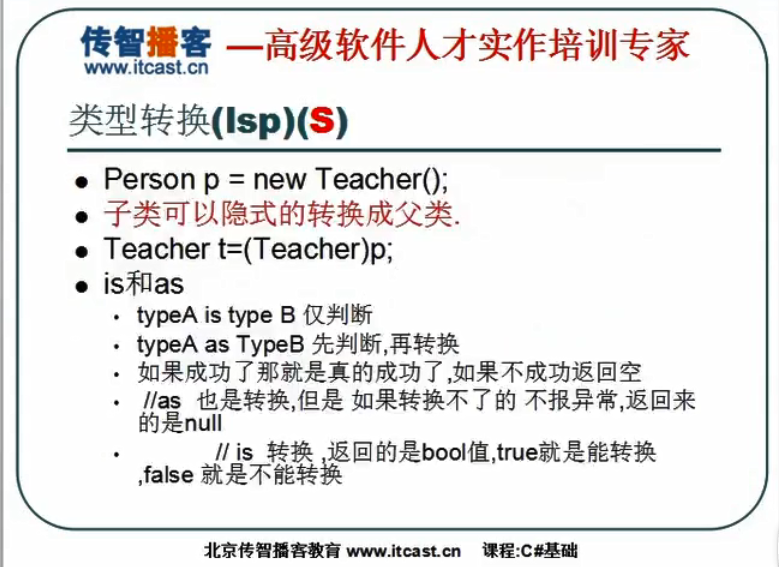1、里式转换
(1)子类可以赋值给父类
(2)如果父类中装的是子类对象,那么可以将这个父类强转为子类对象。
2、子类对象可以调用父类中的成员,但是父类对象永远都只能调用自己的成员.
is:表示类型转换,如果能够转换成功,则返回true否则返回false。
as:表示类型转换,如果能够转换,则返回对应的对象,否则返回null。
using System;namespace _060_面对对象继承_06_里式转换{class Program{static void Main(string[] args){Student student = new Student();//1、子类可以赋值给父类:如果有一个地方需要一个父类作为参数,我们可以给一个子类代替。//Person person = student;//person.PersonSayHello();Person person = new Student();string s = string.Join("|", new string[] { "1", "2", "3", "4", "5" });//new string[]{} --> object 子类赋值给父类Console.WriteLine(s);//2、如果父类中装的是子类对象,那么可以将这个父类强转为子类对象//is的用法if (person is Student){Student student1 = (Student)person;student1.StudentSayHello();}else{Console.WriteLine("转换失败");}//as的用法//Teacher teacher = person as Teacher; 转换失败 teacher中的值为nullStudent student2 = person as Student;student2.StudentSayHello();Console.ReadKey();}}}class Person{public void PersonSayHello(){Console.WriteLine("我是父类");}}class Teacher:Person{public void TeacherSayHello(){Console.WriteLine("我是老师");}}class Student:Person{public void StudentSayHello(){Console.WriteLine("我是学生");}}
练习:
using System;namespace _061_里式转换练习{class Program{static void Main(string[] args){Person[] person = new Person[10];Random r = new Random();for (int i = 0; i < person.Length; i++){int rNumber = r.Next(1, 7);switch (rNumber){case 1:person[i] = new Student();((Student)person[i]).StudentSayHi();break;case 2:person[i] = new Beast();((Beast)person[i]).BeastSayHi();break;case 3:person[i] = new Beauty();((Beauty)person[i]).BeautySayHi();break;case 4:person[i] = new Handsome();((Handsome)person[i]).HandsomeSayHi();break;case 5:person[i] = new Teacher();((Teacher)person[i]).TeacherSayHi();break;case 6:person[i] = new Person();person[i].PersonSayHi();break;default:break;}}//for (int i = 0; i < person.Length; i++)//{// //person[i].PersonSayHi();// if(person[i] is Student)// {// ((Student)person[i]).StudentSayHi();// }// else if(person[i] is Beast)// {// ((Beast)person[i]).BeastSayHi();// }// else if (person[i] is Beauty)// {// ((Beauty)person[i]).BeautySayHi();// }// else if (person[i] is Handsome)// {// ((Handsome)person[i]).HandsomeSayHi();// }// else if (person[i] is Teacher)// {// ((Teacher)person[i]).TeacherSayHi();// }// else// {// person[i].PersonSayHi();// }//}Console.ReadKey();}}}class Person{public void PersonSayHi(){Console.WriteLine("我是人类");}}class Student:Person{public void StudentSayHi(){Console.WriteLine("我是学生");}}class Teacher:Person{public void TeacherSayHi(){Console.WriteLine("我是老师");}}class Beauty:Person{public void BeautySayHi(){Console.WriteLine("我是美女");}}class Handsome:Person{public void HandsomeSayHi(){Console.WriteLine("我是帅哥");}}class Beast:Person{public void BeastSayHi(){Console.WriteLine("我是野兽");}}

